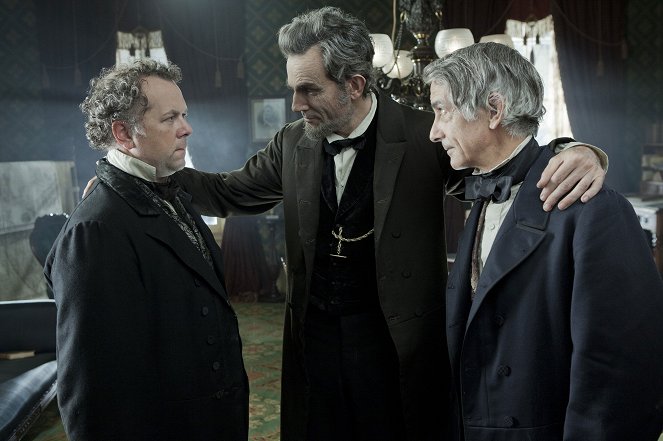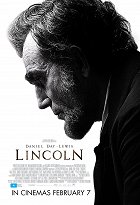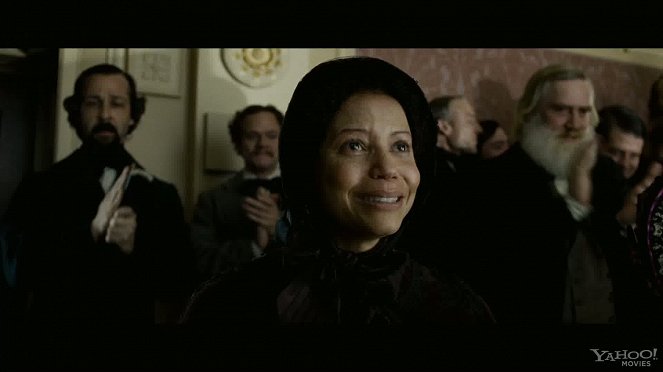Directed by:
Steven SpielbergScreenplay:
Tony KushnerCinematography:
Janusz KaminskiComposer:
John WilliamsCast:
Daniel Day-Lewis, Sally Field, Joseph Gordon-Levitt, Tommy Lee Jones, John Hawkes, Hal Holbrook, James Spader, Tim Blake Nelson, Bruce McGill, Joseph Cross (more)VOD (2)
Plots(1)
A revealing drama that focuses on the 16th President's tumultuous final months in office. In a nation divided by war and the strong winds of change, Lincoln pursues a course of action designed to end the war, unite the country and abolish slavery. With the moral courage and fierce determination to succeed, his choices during this critical moment will change the fate of generations to come. (20th Century Fox UK)
(more)Videos (56)
Reviews (14)
Academy borefest??!! Enslave me, but whoever said this just doesn't have much of a clue as to how far the genius of cinematic storytelling can stretch. Lincoln is a 150-minute long, mostly conversational treasure that, despite the knowledge of the historical outcome, literally engulfs the viewer without a single flinch or flicker of creative indiscretion. A story where there isn't a single scene or line that doesn't fundamentally shift the titular political line or unsentimentally deepen the personal and familial line, which is then logically reflected in the decisions and development of the former. I can't wait to watch it again (and again), to savour more attentively the balanced rhythm with which the lines alternate, overlap and complement each other, the witty interweaving of successive events or the ingenious transitions between scenes, which without exception fit together compositionally and continuously like a full stop at the end of a sentence. Not to mention the brilliant games with lighting and camera positions, the emotions that can only be evoked by the clever handling of editing and narrative direction, and finally the performances of absolutely everyone who appears in front of the camera. Lincoln convinced me of two things: that Abraham Lincoln was one of the greatest figures of the 19th century (even allowing for the undeniable glorification of the film, of course) and that Steven Spielberg is the greatest Hollywood director of all time.
()
Griffith, Ford, Spielberg. Lincoln. Three great American directors and their respective versions of the Lincoln myth. Though Spielberg takes an honest and respectful approach to Lincoln’s personality, creating a cult and idealising a democratic idea is not as important to him as drawing the viewer into the narrative. Above all, this is a riveting political drama, with Abraham Lincoln as the protagonist. It is fascinating to watch how smoothly one of Spielberg’s least action-oriented and least epic films moves forward, how the individual scenes are knitted together, how the director works with the deadline (to get 20 votes by the end of January), how the personal storyline serves the work storyline. The film does not primarily set out to depict Lincoln as a messianic figure demonstrating helpfulness toward all human beings without distinction, and such deification, if it happens, never overshadows the central goal of pushing through the Thirteenth Amendment before the end of the Civil War. We may even have doubts about the “purity” of Lincoln’s relentless pursuit of justice in the face of the law – we are not led to adopt a clear position as actively as in Spielberg’s other socio-political films, e.g. through impassioned music. Furthermore, the narrative is slowed the most by Lincoln’s “Christ-like” tendency to sit down in front of a group of listeners and start telling them a story. Does this really prove to us that Lincoln is the father of the American nation, who could take the liberty of making jokes about George Washington, or have we entered the realm of political satire about an elderly gentleman who liked to talk at times when it was necessary to act? The father interpretation would clearly be more appropriate also for the repeated adoption of the younger son’s childish perspective (including a very clever narrative feint in the climax), but to me it particularly involved the highlighting of the lack of didacticism in Spielberg’s approach. With the flawlessly cast actors and very impressive images (the meaning-making lighting and placement of the characters, frontal shooting, when there is a reason for every movement), With Lincoln, Spielberg primarily constructed an intelligent drama that ceaselessly keeps us on our toes and requires constant linking of contexts. And only then did he create a myth. 90%
()
You are watching this historical borefest and keep thinking to yourself "where the hell did Spielberg's dynamism and fierceness in individual shots go, where’s the drive?". Lincoln is beautifully shot, solidly narrated with strong historical foundations, and Daniel Day-Lewis is once again captivating. However, films like this should be at least a little bit accessible to the audience, in other words, they must not be boring and tedious. Unfortunately, this was not the case here even in the slightest.
()
Big words, lofty speeches, and in a way, just one big Lincoln witticism. Spielberg adored this part of American history so much that a mere history textbook passage was created. Short family passages reveal fragments about the main character and purely focus on addition, peace and political negotiation. No emotions, no enthusiasm. Only with perfectly crafted production and zero added value. And we all knew even before the first clap that Daniel Day-Lewis wouldn't just play Abraham, but he would completely become him. The disappointment is even greater now, as Steven obviously filmed (another) his dream opus magnum and pleased me only with occasional Jones' relaxation and, as expected, the scene of the actual voting itself. The slightly problematic War Horse now looks like a perfect period piece in a new light.
()
I love how different every Steven Spielberg film has been in recent years. How each time he tries a slightly different approach, a different genre, and works with different actors to get it right every time. Like now. For the record, I consider Amistad to be one of Spielberg's best films ever, which made me all the more eager to see how he would deal with slavery this time around. Almost as good (i.e., Amistad is better after all). To make a two and a half hour long film in which there is only talking and dozens of historical characters pass through obviously bothers some people. I don't understand why. A lot of so-called reviewers grumble that the film is a messy, chatty stew that was made just to win an Oscar(s). And most importantly, "there are no battles - even in War Horse there were more". Oh, my God, people! Lincoln is great precisely because there are no battles. We know that the Civil War is raging, we can imagine what a tragedy it is thanks to the opening scene, but why should we continue to watch it? Isn't it enough to watch what it does to people? I think absolutely. The relentless pursuit of the 13th Amendment is a hundred times more thrilling than scenes of a battlefield where cannons tear people apart. And that effort is well described - as is President Lincoln. A sensible and stubbornly opinionated man who has his quirks, his ailments, but also a sense of humor, a perpetual storyteller and (the nicest surprise for me) a thoroughly skilled schemer. The characters, of which there are definitely not as many as many people claim, can be beautifully understood thanks to their performances, the individual stories into which the whole plot is divided are excellent and especially well ended (the last scene of Tommy Lee Jones!). There's not much to say about the actors, Steven Spielberg doesn't pick bad ones... I just wonder why Liam Neeson turned down the role when he's certainly not too old to be the Lincoln we see here. But Daniel Day-Lewis is... Wow! Amazing! So now it's just classic praise for Kaminski's stunning cinematography, which once again plays with light and shadow and looks great in the movie theatre, and of course Williams' music (it doesn't stand out in the film as much as it does on the separate soundtrack, but it's still divine). Five pure stars.
()
Gallery (69)
Photo © Twentieth Century Fox Film Corporation / David James



Ads